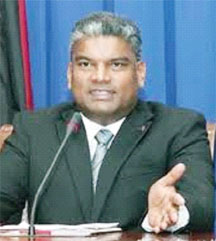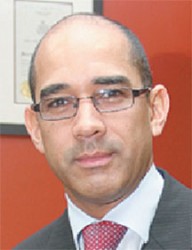(Trinidad Express) Attorney General Anand Ramlogan has refused to confirm or deny an allegation that six days before attorney David West was appointed director of the Police Complaints Authority (PCA), he asked him to withdraw his witness statement in a defamation lawsuit relating to the failed extradition involving Section 34 applicants Steve Ferguson and Ishwar Galbaransingh in exchange for him being selected for the job.

The defamation lawsuit stemmed from statements Ramlogan claimed Opposition Leader Dr Keith Rowley made during a news conference on November 8, 2011, relating to Justice Ronnie Boodoosingh’s ruling in which he quashed the Attorney General’s decision to order the extradition of Ferguson and Galbaransingh arising out of the Piarco International Airport enquiry.
Prime Minister Kamla Persad-Bissessar has not responded to a text message sent to her by the Sunday Express on Friday for comment on the matter. A high-ranking Government official, however, told the Sunday Express that upon receiving the text message, Persad-Bissessar expressed “alarm” over the matter and demanded answers.
West is the former head of the Central Authority Unit (CAU) that falls under the purview of the office of the Attorney General. Ramlogan has not directly answered if it is true he telephoned West and requested his witness statement be withdrawn. He has neither confirmed nor denied contacting West. And, in an e-mailed response to the Sunday Express at 7.49 p.m. on Friday, Ramlogan wrote: “As you have indicated, Mr West is a witness in a case I have brought against Dr Rowley which is pending before the High Court. “It would not be proper for me to comment in the circumstances. Suffice it to say, the director of the PCA is selected and appointed by the President in his wisdom and not the Attorney General.”

The following question was sent to Ramlogan by the Sunday Express: Investigations revealed that on October 31, 2014, you telephoned attorney David West asking him to withdraw his witness statement in relation to extradition matter involving Steve Ferguson and Ish Galbaransingh in exchange for him being selected as director of the PCA. Is this true? If so, why was this done?
But while the questions remain unanswered, Sunday Express investigations have revealed that the AG telephoned West after midday on October 31, 2014. This call to West was the second call that was registered on his cellphone from Ramlogan on that same day (October 31). Ramlogan had telephoned West earlier on the morning of October 31, informing him he was tipped to head the PCA following the resignation of then director attorney Gillian Lucky, who accepted a judgeship in September last year. However, at the time the second telephone call was made, the Office of the President had already contacted West on the same day (October 31) scheduling a meeting with him on November 3 regarding his appointment as PCA head. Section 6 (1) of the PCA Act states the authority is to comprise a director and deputy director to be appointed by the President of T&T on the advice of both the Prime Minister and the Leader of the Opposition.
The Sunday Express learned both Persad-Bissessar and Rowley had agreed West was the best candidate to head the PCA, and as a result his name was submitted to the President for him to be selected for the post.
West seeks legal advice
Immediately following the telephone conversation with Ramlogan, West sought legal advice about the request for the witness statement in the defamation matter to be withdrawn, the Sunday Express learned. West, who was appointed director of the PCA on November 7, however, filed his witness statement at the Hall of Justice on December 19, 2014, a copy of which has been obtained by the Sunday Express. West’s phone logs show the Attorney General attempted to contact him twice on December 16—three days before the witness statement was filed. The calls went unanswered. At the time, West was in Tobago and again sought legal advice.
Contacted on January 22 for comment on the information obtained by the Sunday Express, West said: “The matter is before the court and I cannot comment.” The West witness statement In his witness statement, West details a June 2010 incident surrounding the arrest of Ferguson and Galbaransingh. An excerpt from West’s witness statement reads: “The application for special leave was dismissed by the Privy Council on June 7, 2010, on the ground that they (Ferguson and Galbaransingh) did not have a right of appeal. “As was customary, I advised Inspector Williams, who was the complainant in the extradition matter, to arrest Ferguson and Galbaransingh since their bail had now ceased. “The Government had by then changed, with the claimant being appointed Attorney General in May 2010. I advised the Attorney General of my instruction to Inspector Williams. The Attorney General asked me how I could issue that instruction without telling him; he advised me that only he could make the request to the police. “He then instructed me to rescind my instruction, which I did. As a result, Ferguson and Galbaransingh were not immediately arrested; this occurred on June 15, 2010, approximately one week after the said decision of the Privy Council.” West also recalled an instance where attorney Kelvin Ramkissoon who was retained to lead him (West) for the Attorney General in the extradition matter did not object to bail being granted to Ferguson and Galbaransingh. “To my surprise, at the hearing Ramkissoon again took the novel and different position of neutrality on the issue of bail; he informed the judge (Justice Malcolm Holdip) that we were there to assist the court with the principles of bail. “I informed Ramkissoon that it was standard practice of the CAU to object to bail; consequent to the discussion which occurred between Ramkissoon and myself, I understood that he was acting on instructions from the Attorney General. “The judge, however, refused bail. After the hearing the Attorney General had a conversation with me and instructed me not to get involved in the Piarco extradition matter again,” West wrote.
West, however, said notwithstanding the instruction, he continued to pay attention and follow the progress of the Piarco extradition matter. His statement continued: “On or around October 8, 2010, some two and half months after the Privy Council refused special leave to appeal on the habeas corpus application, the Attorney General issued the warrant for the return of Ferguson and Galbaransingh to the United States. “I also observed, from my reading the daily newspapers around that time that the Attorney General also issued a press release. “I was surprised at the timing of the press release given that from my said experience with the CAU, the invariable practice has been to issue any such press release after the extradition was completed, not before, that is to say after the fugitive had been removed from the jurisdiction of T&T.”
On Ramlogan’s decision not to appeal Justice Boodoosingh’s ruling, West wrote: “From my reading of the judge’s decision, I observed that at paragraph 135 of his judgment, the judge stated that the Attorney General had not advanced any evidence to suggest that there existed a settled practice of discontinuing local charges if the fugitive is extradited. “I am able to say from my said experience of working in the CAU that the DPP has in the past agreed in extradition matters to the discontinuation of local charges so that the extradition could proceed and that evidence of that practice exists among the records of the unit.”
Why Ramlogan didn’t appeal Boodoosingh’s ruling
Ramlogan had come under fire from several quarters for his decision not to appeal the ruling. But he gave reasons for his decision in his 55-page witness statement that has also been obtained by the Sunday Express. An excerpt from his statement reads: “When the judgment was delivered, I sought and obtained legal advice as to whether I should appeal the decision of the court. “Based on the advice which I received I did not do so. “However, my decision in not doing so was not only predicated or guided by the advice which I received. I took into consideration a number of matters and spoke to the Director of Public Prosecutions (DPP) on the issue of having Ferguson and Galbaransingh tried in T&T and how soon this could be done.” He further added: “In fact, I recall meeting with the DPP on two occasions relative to this matter. The first was when I received the representations made by Ferguson and Galbaransingh. “I also met with him on a second occasion before I decided whether or not to surrender Galbaransingh and Ferguson. I wanted to determine the exact status of the proceedings in the preliminary enquiry. “After discussions with the DPP, I formed the distinct impression that the outstanding preliminary enquiry was extremely near in completion.”
Ramlogan said in deciding whether to appeal the ruling, he considered his (Boodoosingh’s) judicial declaration the forum for the trial of Ferguson and Galbaransingh was T&T. The Attorney General said judicial statements made by Court of Appeal Judges Wendell Kangaloo and Allan Mendonca were also given consideration. “I therefore considered that when the indictment of these people is laid by the DPP, there can be a special court (such as the type done for trial of Dole Chadee and others at Chaguaramas in 1996) and that where possible, the Attorney General would assist in facilitating resources for this purpose,” Ramlogan said. Rowley stands firm Meanwhile, Rowley is standing firm by his position that Ramlogan had not sought or advanced the public interest in the conduct of the legal proceedings involving Ferguson and Galbaransingh. In his witness statement, Rowley said his concerns were based on the Attorney General’s legal team representing the interest of the State and his handling and defence of the extradition order. “I therefore considered it my duty and responsibility as Leader of the Opposition to inform the public what the claimant was required to do as Attorney General in dealing with the extradition of Ferguson and Galbaransingh, and that, as Attorney General he was ultimately accountable for the loss which the State suffered in those legal proceedings because of the way that he had handled the extradition matter,” an excerpt from his witness statement read.
